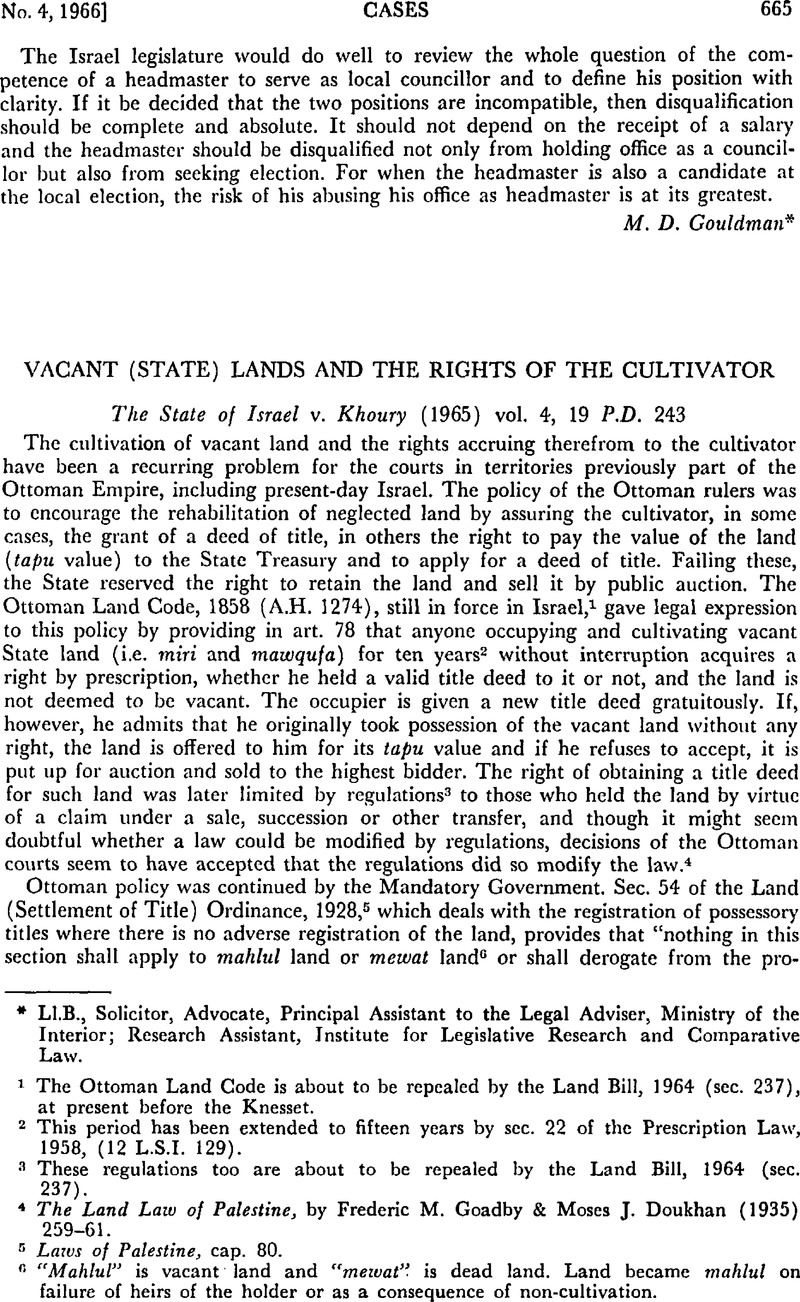No CrossRef data available.
Article contents
Vacant (State) Lands and the Rights of the Cultivator
Published online by Cambridge University Press: 12 February 2016
Abstract

- Type
- Cases
- Information
- Copyright
- Copyright © Cambridge University Press and The Faculty of Law, The Hebrew University of Jerusalem 1966
References
1 The Ottoman Land Code is about to be repealed by the Land Bill, 1964 (sec. 237), at present before the Knesset.
2 This period has been extended to fifteen years by sec. 22 of the Prescription Law, 1958, (12 L.S.I. 129).
3 These regulations too are about to be repealed by the Land Bill, 1964 (sec. 237).
4 The Land Law of Palestine, by Goadby, Frederic M. & Doukhan, Moses J. (1935) 259–61.Google Scholar
5 Laws of Palestine, cap. 80.
6 “Mahlul” is vacant land and “mewat”. is dead land. Land became mahlul on failure of heirs of the holder or as a consequence of non-cultivation.
7 Bashir v. State of Israel (1961) 15 P.D. 2145, 2148. Here the Court expressly said that the provisions of sec. 154 did not derogate from the provisions of art. 78 in the sense that he who in the course of settlement proceedings claims rights of ownership in unregistered miri land must prove both possession and cultivation for the required period which is now 15 years.
8 Laws of Palestine, 1918–1925, compiled under the editorship of Moses Doukhan (Rotenberg, Tel-Aviv, 1933) 303.
9 5 L.S.I 45
10 12 L.S.I. 129, amended in 1965 (Sefer HaChukim, 450, p. 103).
11 Habiby v. Government of Palestine (1940) 7 P.L.R. 288.
12 Omer v. State of Israel (1961) 15 P.D. 2552; State of Israel v. Trablus (1962) 16 P.D. 1451.
13 Farhat v. State of Israel (1961) 15 P.D. 248, 251.
14 Hatzaot Hok, No. 612 of 15.6.64.
15 “State Land” under the Bill (sec. 177) is “Israel land” within the meaning of the Basic Law: Israel Lands, 1960, (14 L.S.I. 48) and those mean “lands in Israel of the State…”.
16 Art. 180 deals with restrictions as to prescription in public property and states that there shall be no prescription with regard to “public utility property” (as defined in sec. 177) and in the case of public property other than public utility property it provides certain technical provisions distinguishing the commencement of the period of prescription as between registered and non-registered property.
17 In the case of improper registration the period of prescription is fifteen years (sec. 22).
18 Farhat v. State of Israel, cit.; Orner v. State of Israel, cit.; Said v. State of Israel (1962) 16 P.D. 1473; State of Israel v. Nazel (1962) 16 P.D. 1722.
19 (1965) vol. 4, 19 P.D. 243.
20 The second respondent later withdrew his claims and only the first respondent remained. The judgment of the Court of Appeal concerns him only.
21 Omer v. State of Israel, cit.; State of Israel v. Salah (1962) 16 P.D. 1446; State of Israel v. Khair (1963) 17 P.D. 631; Said v. State of Israel, cit.; Farhat v. State of Israel, cit., at 250; State of Israel v. Trablus (1962) 16 P.D. 1451; State of Israel v. Mazal, cit.
22 Farhat v. State of Israel, cit.; Omer v. State of Israel, cit.; Bashir v. State of Israel, cit., at 2149.
23 El-Gadir v. State of Israel (1961) 15 P.D. 648, 652; Said v. State of Israel, cit., at 1475.
24 State of Israel v. Khair, cit., at 633.


